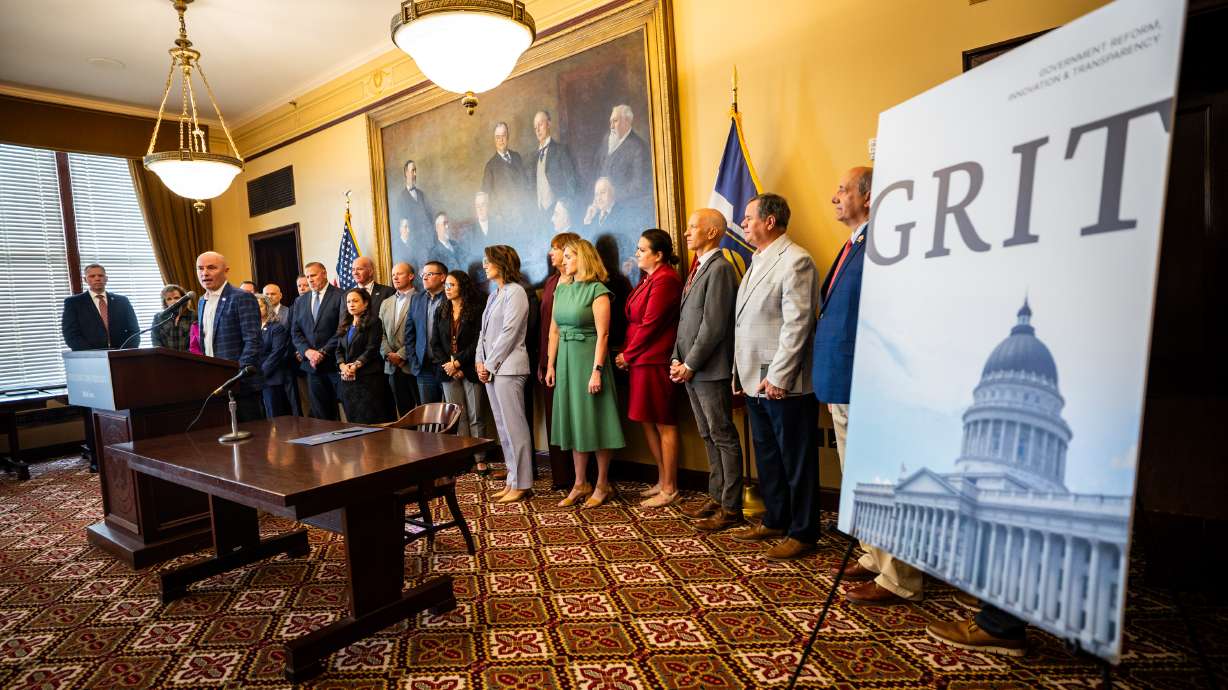Estimated read time: 4-5 minutes
- Utah Gov. Spencer Cox signed an order creating a Government Reform, Innovation and Transparency initiative.
- Agencies must submit efficiency improvements and publish results to an online public dashboard.
- Cox emphasizes Utah's proactive approach, contrasting with federal Department of Government Efficiency cuts.
SALT LAKE CITY — Utah leaders love to compare the state's operations to the dysfunction in Washington, touting the Legislature's productivity, bipartisan approaches to certain issues and — perhaps most importantly — Utah's balanced government budget.
Unlike the U.S. government, Utah has limited money to allocate each year for social services, transportation and education, meaning many beneficial projects and programs don't get the money they request. Gov. Spencer Cox is asking each state agency to dig deeper to improve government efficiency, signing an executive order Friday to create a Government Reform, Innovation and Transparency initiative.
As the so-called federal Department of Government Efficiency has made headlines in Washington, Cox insists Utah is well ahead of the curve when it comes to improving government and said his order is meant to further ongoing efforts in the state.
"DOGE is awesome, and we — I desperately want DOGE to work," he told reporters at the Capitol Friday. "We have a bloated federal government that is a disaster. We've been begging for something like DOGE for decades and I'm so excited that it is actually happening. Let me be very clear to people that are watching this: We do DOGE like six times a year in this state. Every single year we DOGE the hell out of our budget."
"We were DOGE when it wasn't cool," he added, "and we will be DOGE long after it is cool."
Cox signed the order in the Capitol Board Room, flanked by a score of cabinet advisers, who, under his order, will be required to submit at least one efficiency improvement to the Governor's Office of Planning and Budget by July 1, launch at least one additional project per division or office, join a statewide learning network, take public feedback on improvements and report results on a public dashboard.
The initiative was announced internally a week ago, and department heads are already working to streamline bureaucracy by building on existing programs.
"This is only the beginning," said Sophia DiCaro, executive director of the Office of Planning and Budget. "The GRIT initiative is going to enable us to wrap all of this under an umbrella and make a really meaningful difference."
She highlighted efforts to reduce wait times for walk-in appointments at the Division of Motor Vehicles and recruitment efforts within the Utah National Guard as examples of programs already ongoing within the state. A government efficiency dashboard on the state website will soon highlight the progress and changes made under the initiative.

While Cox lauded the goals of the Department of Government Efficiency, he was quick to differentiate from the slash-and-burn tactics employed during the early days of Trump's second presidency — which have caused backlash from demonstrators, including in Utah.
"One of the concerns I have about DOGE is that there's slashing going on — which we desperately needed — but unfortunately, they're not looking at outcomes and sometimes you slash something and the thing gets worse," he said. "We want to make things more efficient and some of that is cutting time, right? Cutting wait times, processing things more quickly. Sometimes you actually have to add people to get the right outcome."
The state is also "not looking at mass layoffs," the governor said, adding that he is trying to "empower" state employees to "make things better," not intimidate them. Some spending cuts may be necessary, but Cox said he's encouraging state leaders to find ways to allocate money to projects where it can make the most impact.
"There may be some changes that happen ... we may need to move some people in some other ways that will be better, where we find better ... processes, better ways to do these types of things better," Cox said.
Because Utah is already running a much tighter ship than the federal government, Cox said rooting out inefficiency will be much harder.
"We've done all the low-hanging fruit," he said. "With DOGE there's so much low-hanging fruit. ... We can find a billion here a billion there. It's going to be harder for us, for sure, but we know it can be done."
The initiative doesn't set a specific goal for the amount of money saved, but Cox said each agency will eventually identify targets. The order is effective immediately and expires on Jan. 19, 2029, after Cox's second term ends.










